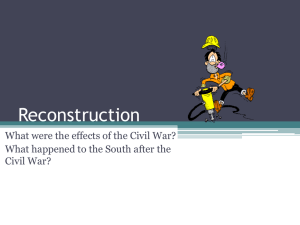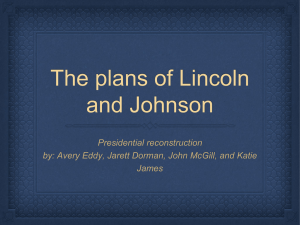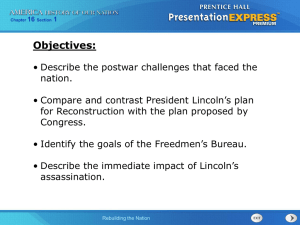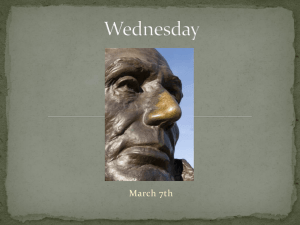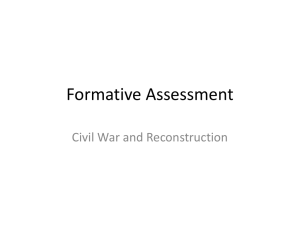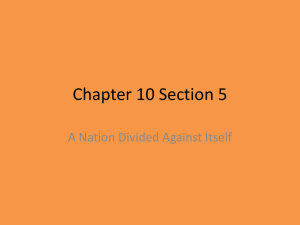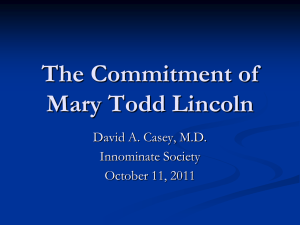Chapter 17 Reconstruction and the New South (1865
advertisement
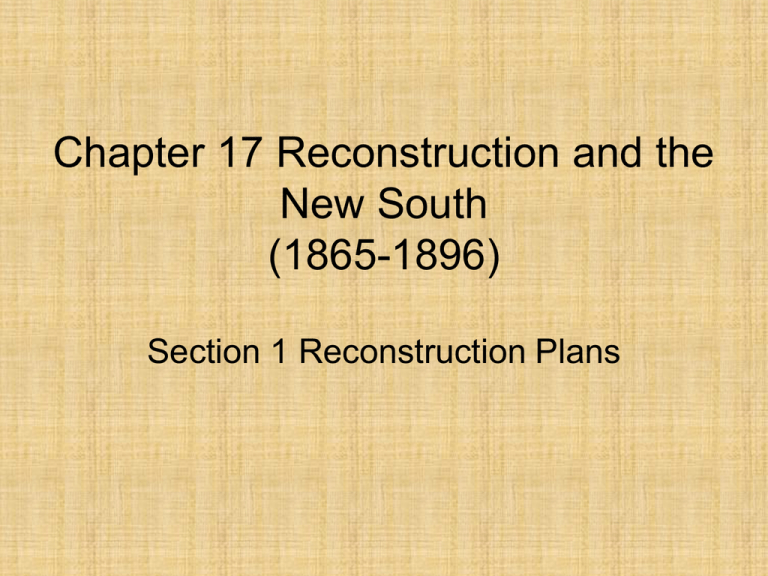
Chapter 17 Reconstruction and the New South (1865-1896) Section 1 Reconstruction Plans Chapter Time Line Chapter Time Line If you were President Lincoln, how would you have treated the South after it lost the Civil War? A. I would have punished the South severely. B. I would have forgiven the states and allowed them to rejoin the Union immediately. A. A B. B I would have allowed the states to rejoin theC. C Union but not given them representation in government for a certain amount of time. D. D 0% D 0% C 0% B D. 0% A C. I would have allowed the southern states to rejoin the Union as soon as they denounced slavery. u e s t i o n How did plans to unify the nation differ after the Civil War? Reconstruction Debate • The Union was saved • Now the challenge was reuniting and rebuilding the country • The Southern states needed to be readmitted • The Southern economy and society also needed to be rebuilt • Americans disagreed on how this should happen • The period of rebuilding is called Reconstruction • Also refers to the various plans for readmitting the Southern states to the Union Lincoln’s Plan • December 1863, during the Civil War • Lincoln introduced the Ten Percent Plan • When 10% of the voters of a state took an oath of loyalty to the Union, the state could form a new government • And adopt a new constitution that banned slavery • Lincoln believed that punishing the South would serve no purpose and would only delay healing the torn nation Lincoln’s Plan Continued • Lincoln offered amnesty (a pardon) • To all white Southerners who were willing to swear loyalty to the Union • Except Confederate leaders • 1864- 3 states under Union occupation (Louisiana, Arkansas, and Tennessee) set up governments under the plan • But the Congress refused to seat the states’ representatives The Radicals’ Plan • Some Republicans saw Lincoln’s plan too forgiving • They favored a more radical approach and were called the Radical Republicans • Radical Republican Thaddeus Stevens said that Southern institutions “must be broken up and relaid, or all our blood and treasure have been spent in vain” • Congress was controlled by the Radical Republicans and voted to deny seats to representatives from any state that was readmitted under Lincoln’s plan Wade-Davis Bill • July 1864- Congress passed the Wade-Davis Bill • To rejoin the Union, a state had to meet several requirements • 1. A majority of the state’s white males had to swear loyalty to the Union • 2. Only white males who swore they had not fought against the Union could vote for delegates to a state constitutional convention • 3. New state constitutions had to ban slavery • The bill would also ban former Confederates from holding public office Lincoln’s Response • Lincoln refused to sign the WadeDavis Bill • But he wanted state governments to form quickly • Lincoln wanted order restored in the South as soon as possible • Lincoln would have to compromise with the Radical Republicans Which of the following was a provision of the Wade-Thomas Bill? A. African American males in a state had to swear loyalty to the Union. B. Former Confederates could not hold public office. D. 0% 0% D 0% C A 0% B C. A. A Confederate states could be admitted to the Union even if B. B they kept slavery. C. C Half of all delegates to a constitutional convention had to be formerly enslaved people. D. D The Freedmen’s Bureau • March 1865- Lincoln and Congress set up the Freedmen’s Bureau • The bureau helped African Americans adjust to freedom • It provided food, clothing, and medical services • Also helped freed people acquire land or find work for fair wages • Also set up schools and gave aid to new African American institutions of higher learning • Including Atlanta University, Howard University, and Fisk University April 14th, 1865 • President Lincoln attended a play at Ford’s Theatre in Washington, D.C. • John Wilkes Booth entered the private box and shot Lincoln in the head • Lincoln died hours later • Vice President Andrew Johnson became president • John soon revealed his plan for Reconstruction (Called- Restoration) Restoration • Johnson’s plan would grant amnesty to most Southerners once they swore loyalty to the Union • High-ranking Confederates could be pardoned only by appealing to the president • This showed that Johnson wanted to humiliate the leaders who he believed had tricked the South’s people into seceding • John said only loyal, pardoned whites could vote for delegates to the state constitutional conventions • John stated “white men alone must manage the South • Johnson opposed equal rights for African Americans Restoration Continued • States had to denounce secession and ban slavery before reentering the Union • States also had to ratify the 13th amendment (Abolished slavery in the US) • By the end of 1865 all former confederate states had new governments and were ready to rejoin the Union • Except Texas What did the Thirteenth Amendment accomplish? A. It welcomed former Confederate states back into the Union. 0% 0% 0% D D. It abolished slavery throughout the Union. A 0% A B C D C C. It pardoned Confederate leaders. A. B. C. D. B B. It made secession illegal. u e s t i o n How did plans to unify the nation differ after the Civil War? -Lincoln wanted to avoid punishing to promote healing, so he offered amnesty to all white Southerners except Confederate leaders -Radical Republicans favored harsher measures that would break up and rebuild the South’s institutions and ban former Confederates from holding office -Johnson wanted to pardon most Southerners but humiliate Confederate leaders Chapter 17 Section 1 Quiz The period after the Civil War is know as Rebuilding. ls e 50% Fa 50% Tr ue A. True B. False ls e Fa Tr ue The Ten Percent Plan required 10 percent of the voters of a state to take an oath of loyalty to the Confederacy. A. True 50% 50% B. False In 1864 the Union army occupied Louisiana, Arkansas, and Tennessee. ls e 50% Fa 50% Tr ue A. True B. False The Wade-Davis Bill countered the Ten Percent Plan. ls e 50% Fa 50% Tr ue A. True B. False Lincoln was assassinated while attending a play. ls e 50% Fa 50% Tr ue A. True B. False The period of rebuilding the South after the Civil War was called amnesty. war spoils. Reconstruction. Civil War Rebuilding. . in g . R eb ui ld io n lW ar on st ru ct C iv i R ec w ar sp ne s oi ls . ty . 25% 25% 25% 25% am A. B. C. D. ill B. .. B &# 0 39 ;s io n dm en Fr ee R ec on st ru ct av -D ad e W Te n Pe rc e nt is B Pl an ill What is the name of the decree that required a majority of the white males in a state to swear loyalty to the Union? A. Ten Percent Plan 25% 25% 25% 25% B. Wade-Davis Bill C. Reconstruction Bill D. Freedmen's Bureau African Americans were helped to make the transition to freedom by the A. Wade-Davis Plan. B. Ten Percent Plan. C. Reconstruction Act. D. Freedmen's Bureau. Fr ee ec R B. .. ;s 39 &# 0 dm en on st ru ct io n nt rc e Pe n Te A . Pl an an . Pl is av -D ad e W ct . 25% 25% 25% 25% President Abraham Lincoln was shot at A. the White House. B. Ford's Theater. C. Samuel Mudd's house. D. William Petersen's house. #0 ... 39 .. n& #0 W ill ia m Pe te lM ud rs e d& Th e m ue Sa rd & Fo th e #0 3 9; s W hi te Ho u se at er . . 25% 25% 25% 25% The person who was president after Lincoln was Andrew Johnson. Daniel Webster. John C. Calhoun. Andrew Jackson. on . ks un . Ja c al ho re w .C nd A Jo hn C ie l an D nd re w Jo h W eb ns st e on . r. 25% 25% 25% 25% A A. B. C. D. Participant Scores 0 0 Participant 1 Participant 2 0 0 0 Participant 3 Participant 4 Participant 5 Team Scores 0 0 Team 1 Team 2 0 0 0 Team 3 Team 4 Team 5
